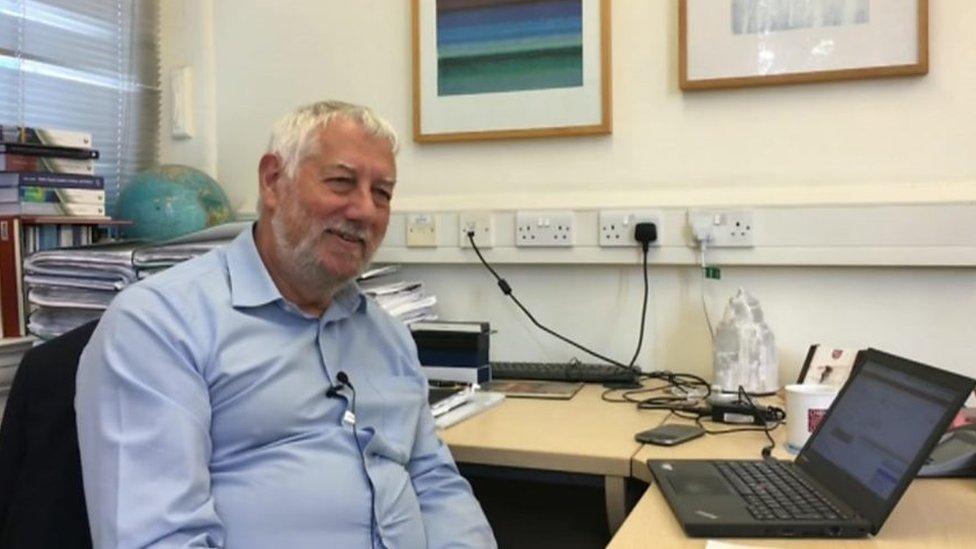Ideas: Can one building's design help improve society?
- Published
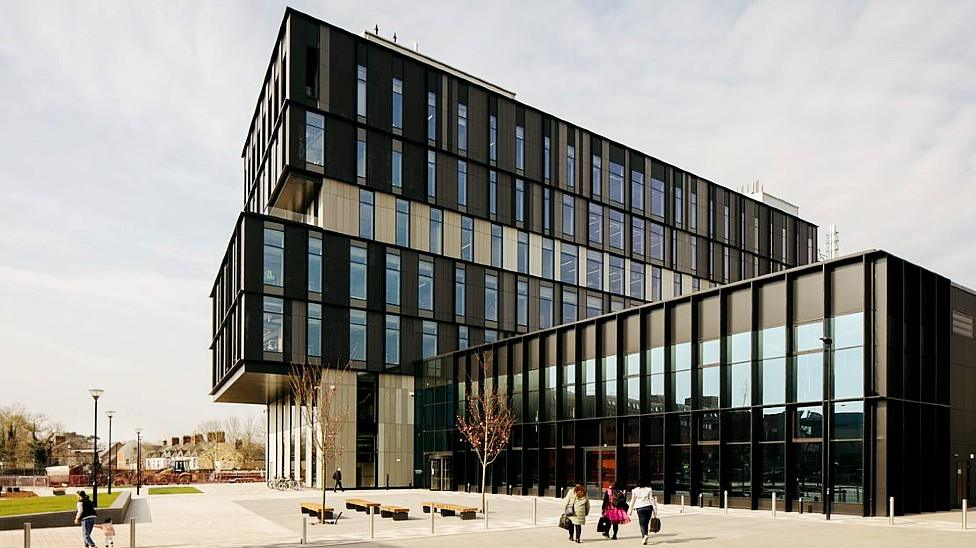
The building's design is layered like a stack of books to reflect its learning aims
Can the design of a building help create a better society?
The designers of Spark|Sbarc are hoping the structure, which aims to mimic a stack of books piled on top of each other, will allow its tenants to cross-fertilise ideas and bring concrete improvements to the lives of Welsh citizens.
Billed as the world's first social science research park, the Cardiff University centre was first conceived at the social innovation agency Nesta Cymru - which now has its home in the building - and also drew inspiration from visits to Harvard, Stanford and MIT universities in the US.
Sally O'Connor, the director of operations at Spark, located on the university's innovation campus at Maindy Park, said the space was intended to facilitate building relationships between its inhabitants, which include academics doing research at the university and private and third sector tenants who can help to put ideas into practice.
The building, designed by architech firm Hawkins Brown, sits alongside other cutting edge research centres such as Cubric - Cardiff University Brain Imaging Centre, Europe's biggest at the time of its opening in 2016 - and the Hadyn Ellis Building for medical science research.
However an important element is also creating real links between Spark and the local community. "Building relationships with the community is vital," she said. "You can't just build [the physical structure] and hope they come."
And any organisation coming in as a tenant must have a relationship with the university which will be further fostered by their presence, she stressed. It is not just office space for rent.
At present, there are about 12 external partners located in the building, which only opened in March, but that number will - carefully - grow in time.
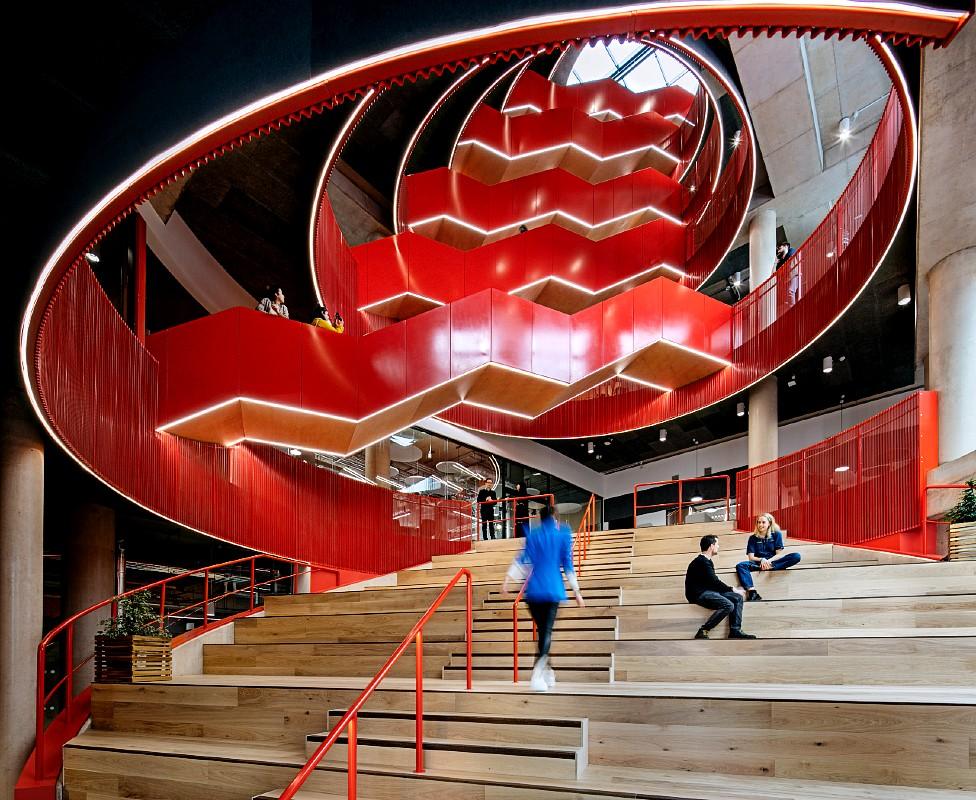
The staircase at Spark also acts as an informal sitting and meeting place
One of the concepts behind the building is the circular economy, an idea very much at the heart of the Welsh government's future strategy. This is where products and resources are kept in use rather than being sent to landfill.
To this end, one of the most promising sites within Spark is RemakerSpace, planned to open this autumn. It will offer access to 3D printers and other tools with which, as its name suggests, will be used to "remanufacture" or repair existing products that have broken or are in need of some attention to keep them in operation.
Parts become obsolete, and it becomes very hard to get replacement parts when something has failed on a product
One of its managers is Dr Daniel Eyers, reader in manufacturing systems management at Cardiff Business School, who says RemakerSpace's mission is to help different communities in Wales understand more about remanufacturing.
He said: "Wales is excellent at recycling. We exceed the EU threshold for recycling.
"Recycling's great, but it takes a high-value product, like a TV or a chair or something like that, and it converts it into its component material - wood, plastic, those kinds of things - and you lose all the value.
"The idea in remanufacturing is that we want to retain the value in the products as long as possible, and our centre is about restoring and extending the life of products that people have bought."
When a product breaks or appears to reach its end of life, RemakerSpace would aim to restore it to a condition "good enough that you would get a warranty on it" and be able to reuse it for years to come, he explained.
The space has three labs with different function. One is centred on education and training, one is a conventional workshop "full of saws, drills, hammers, all the traditional things you might find in a repair workshop for people to come and use and to repair their products with".
The third is a 3D printing workshop. State-of-the-art printers can be utilised to create bespoke parts to fix products which may otherwise end up as unnecessary landfill, Dan explained.
"One of the problems you get with products that are in people's houses and in factories and shops are that parts become obsolete, and it becomes very hard to get replacement parts when something has failed on a product," he said.
"So you might have a situation where you have a minor fault on a product, but you need to effectively replace it because you can't get the spare part. If it's a plastic part, we can 3D print replacement parts."
The machines can even produce parts which are "pre-worn" to fit into older appliances which may have slightly altered shape due to wear and tear over the years.
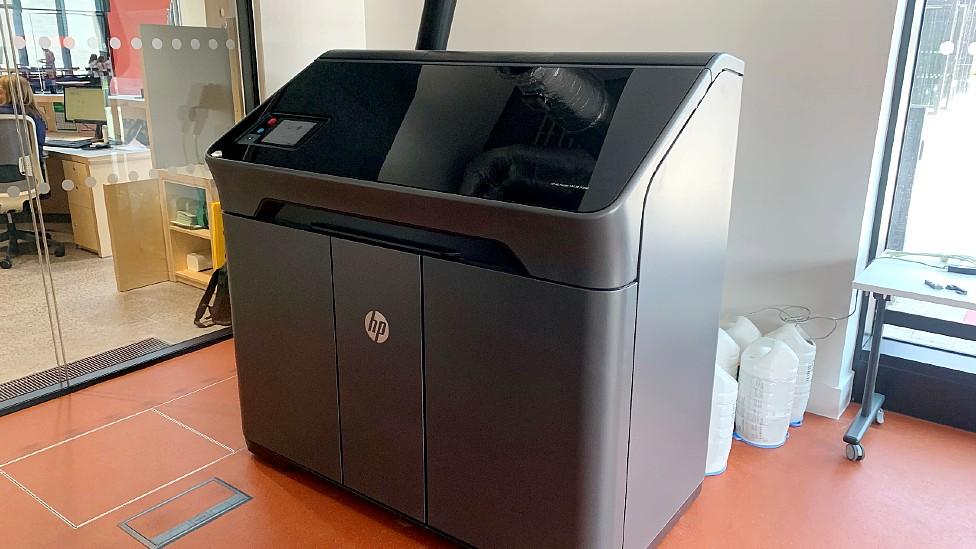
One of the 3D printers which will be used to print bespoke components to fix broken items
Because the equipment is funded by the Welsh government and ReMakerSpace operates as a non-profit, it is free to use, although there might be a charge to cover component costs.
Its founders were inspired by the Repair Cafe network, which offers conventional repairs to household items for free at sessions held in public venues.
But Dan is keen to stress that they see themselves as a complementary rather than competing service, and they have more of an emphasis on working with "thematic groups" of people and learning.
They have started the process of working with industry to help companies re-engineer their supply chains and products to increase lifespan and improve reuse later down the line.
The university's schools liaison team is already working on projects with schools connected to RemakerSpace and once final safety checks are in place, the centre will be welcoming local schoolchildren in to have first-hand experience of what it can do.
He said: "We're very much on the education and training provision. What we are fortunate with this grant from the Welsh government is it gives us the equipment to demonstrate and show the individuals, students and businesses how to do remanufacturing in practice."
As RemakerSpace was involved in the creation of Spark from the outset, its custom-designed labs are a huge benefit of the Spark building for their work.
Dan said: "The whole ethos of the building is about engagement, whether that's with industry or research or within the community. We support what they're doing; we're a very natural fit for that."
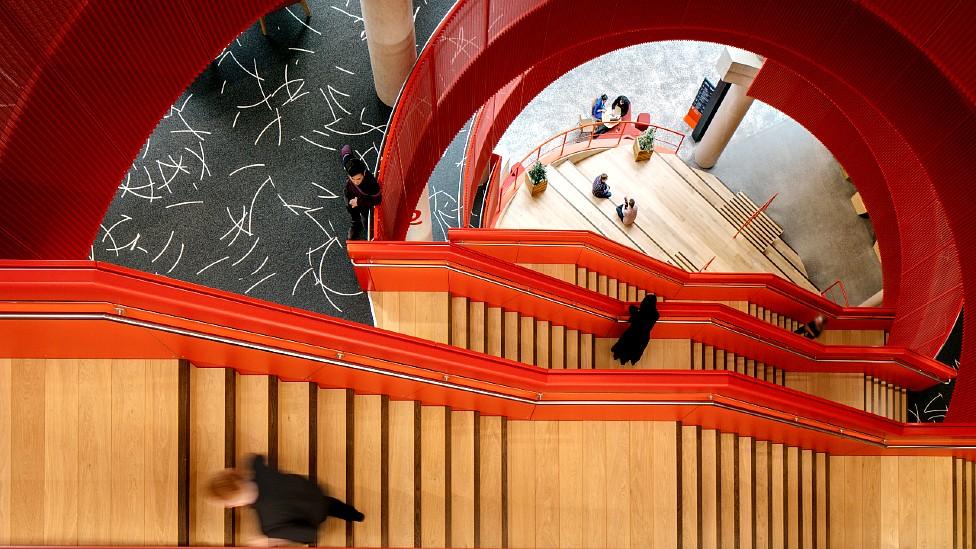
Openness and interconnectedness are key elements of Spark's design as the central stairwell shows
What is innovation?
Whilst RemakerSpace has a practical application which can be seen, other tenants are more on the ideas side of delivering social change.
These include: the Wolfson Centre for Young People's Mental Health, looking at reducing anxiety and depression in the young; Simply Do, a tech company using artificial intelligence to help public service providers effect changes in practice; Hate Lab, a hub analysing hate speech and crime; and Cascade, a children's social research and development centre for children with social care needs. Policy thinktank the Institute of Welsh Affairs moved its office into the building when it opened.
Another is Y Lab (The Lab), which director Prof James Lewis describes as the public services' innovation lab for Wales. Originally a joint project between Nesta Cymru and Cardiff University, it is now run solely by the university and funded by around 12 organisations including the Welsh government, Arts Council of Wales and the Wales European Funding Office.
Y Lab has two main things to do, James explained. "We co-deliver innovation programmes that support Welsh public servants to innovate.
"When we do that we typically bring public servants together in groups, or cohorts we call them. They do things together and we give them skills and support and a variety of different things.
"We also do research on the how's and whys of public service innovation; what works well, what doesn't work so well, what enables innovation." A current six-month project has one cohort looking at how a local authority can decarbonise its work.
The building is designed in such a way that we will bump into one another and have those conversations while you're making a cup of coffee
Finding ways of delivering efficiencies are a no-brainer in a country which spends £6bn on public services, but James says it's not all about the bottom line.
"One definition of innovation is ideas successfully applied - ideas is invention, ideas applied is change and ideas successfully applied is innovation.
"Another one is implementing new ideas to create value. That value doesn't have to be financial. It can be democratic legitimacy, it can be efficiency, it could be a better experience for citizens, it can be whatever you like," he explained.
"But there's something about new ideas - not necessarily new to the world but new to the organisation - that are implemented that do some good."
'Right kind of thinking'
He gave an example of trialling an idea for foster care originally used in the US which was being tested in an urban area of England. Flintshire local council wanted to see if the system would work in a rural area.
A group of six foster families who may not have known each other previously form an extended "family", with one family acting as the hub lead family.
Y Lab provided funding, research support and skills for the council to test it out.
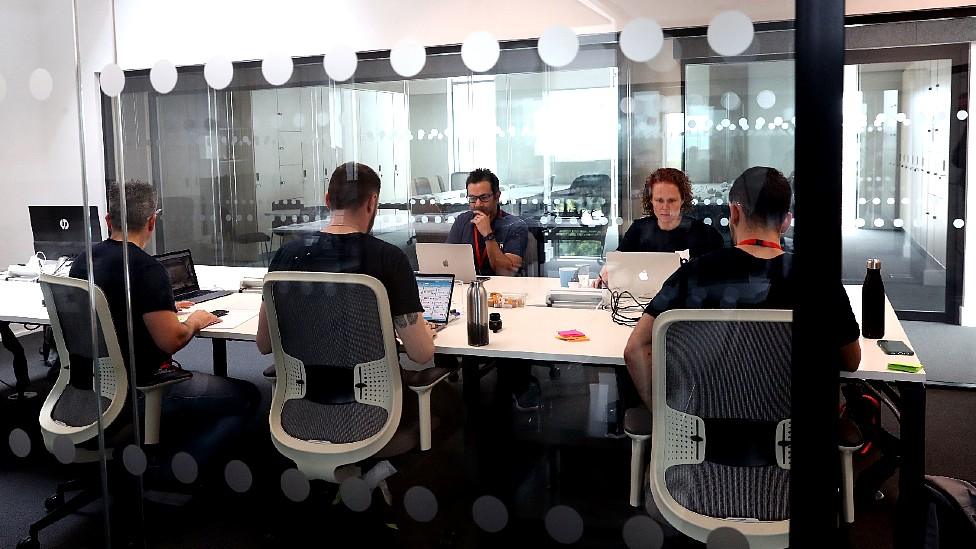
Glass-enclosed work spaces help to promote the openness and sharing ethic of Spark
"They did a fantastic job and got over £1m in loan financing from the Welsh government to do it with the idea that if foster care goes better, if people stay as foster carers it can have large financial savings for local authorities. It's much better for the children and it's better for the families," James said.
"They've supported 50 families fostering 80 children which was a real lifeline for them all during lockdown. Often they had foster families who lived a couple of streets from each other who had no idea about each other's existence.
"The kids can get to know each other and the families provide emotional support and all that kind of thing."
'Right kind of thinking'
Other examples of their work include looking at using behavioural science during the Covid response for the Welsh government, better targeting of support for people in fuel poverty and electric vehicle use by local authorities.
But how much of a help is it for Y Lab to be located in the Spark building?
James thinks it makes a significant difference. "What you want to do for innovation is to combine deep understanding of the problem, which comes partly from academia and partly from front-line staff and people who experience the issue in their everyday life, with innovation methods and mindsets and an injection of creativity to make innovation happen.
"Now we've got even more of it under one roof. If we wanted to do something about school health or school children's health for example, we have Decipher, external [here], a research centre dedicated to that."
The building has a monthly meeting for centre directors to attend to help with the cross-fertilization of ideas but there are also more informal events open to anyone working under its roof, such as a coffee and sandwiches event laid on by the in-house cafe, where people can mingle and chat.
James said: "The building is designed in such a way that we will bump into one another and have those conversations while you're making a cup of coffee or while you're grabbing a sandwich in the queue downstairs.
"All of that stuff means that you have the right people together at the right time to do the right kind of thinking."

WALES' HOME OF THE YEAR: Which home will Owain, Mandy and Glen judge worthy?
SEARCHING FOR MY OTHER MAM: Gerallt searches for the father and mother he never knew

- Published27 November 2021
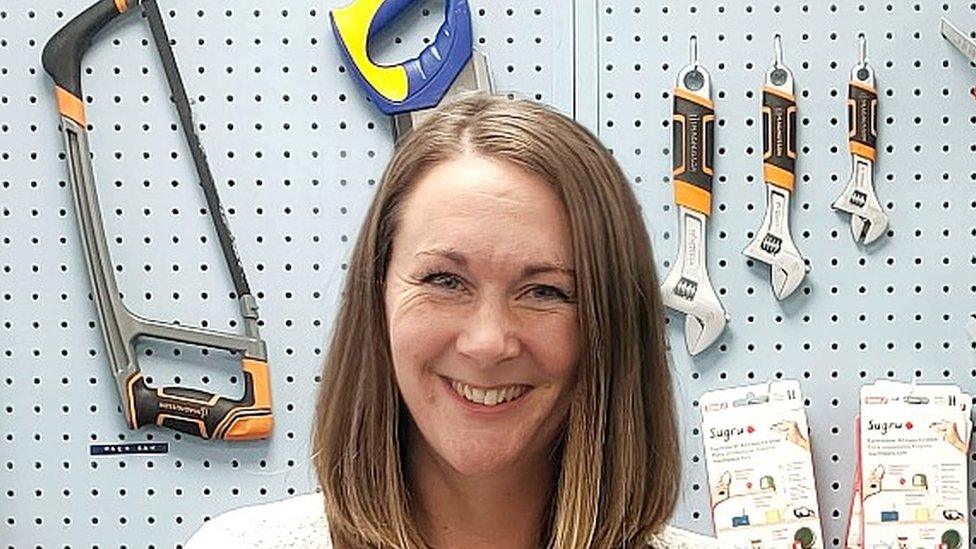
- Published11 August 2022
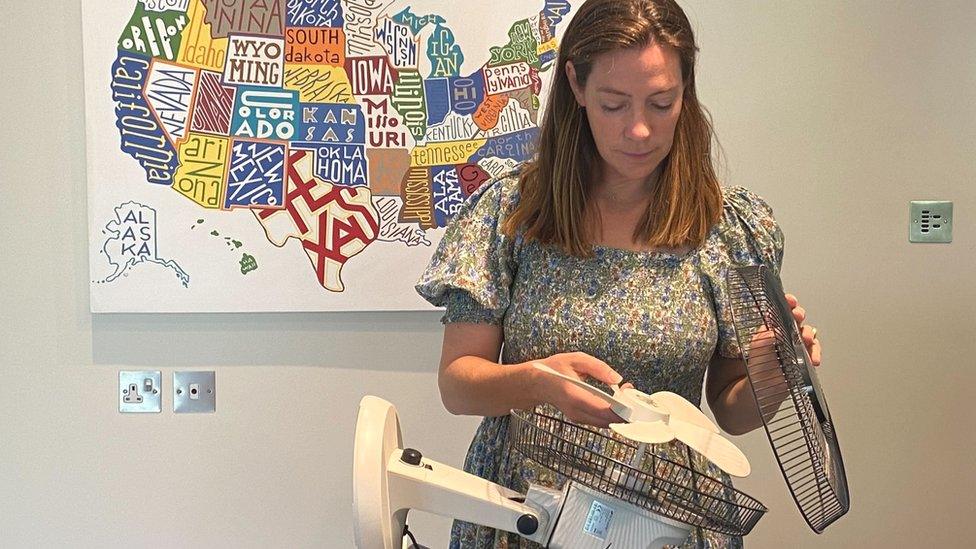
- Published26 March 2018
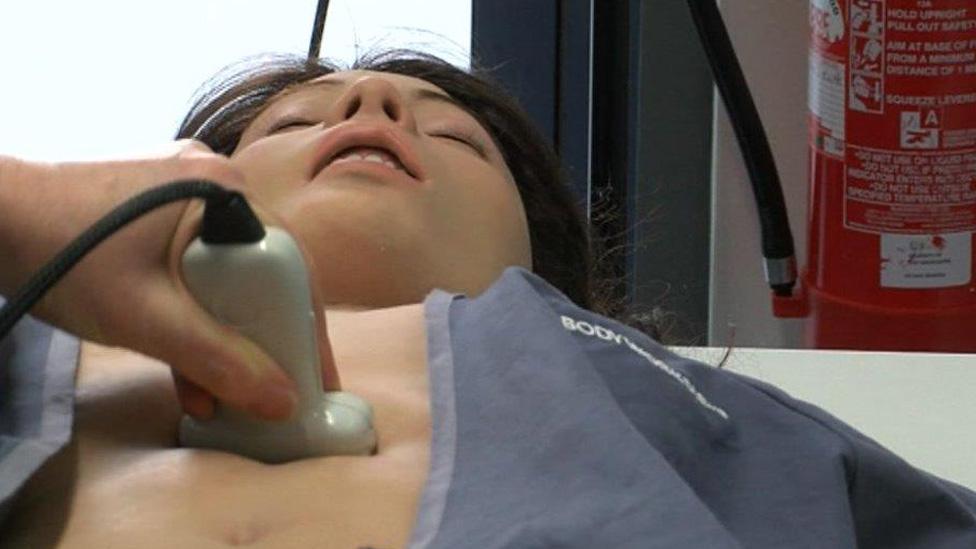
- Published29 April 2019
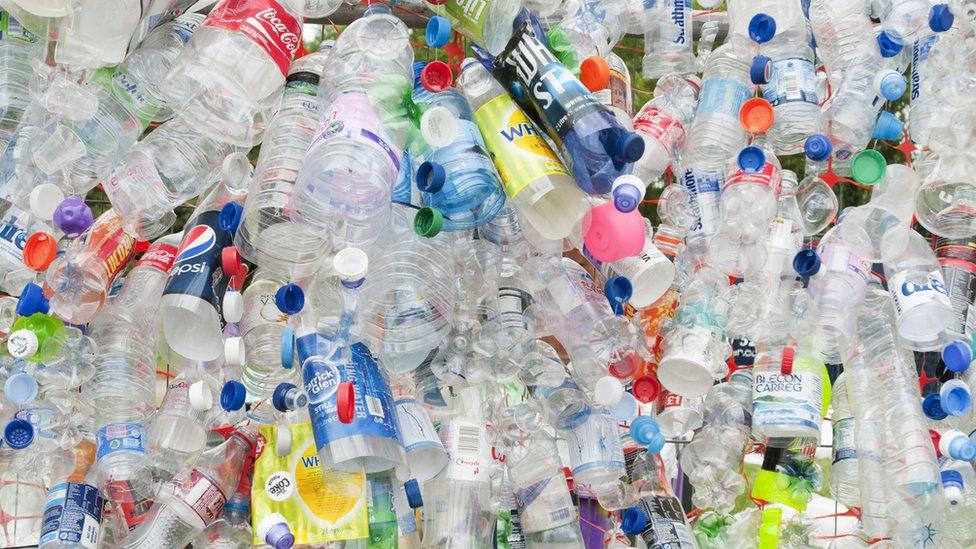
- Published4 October 2017
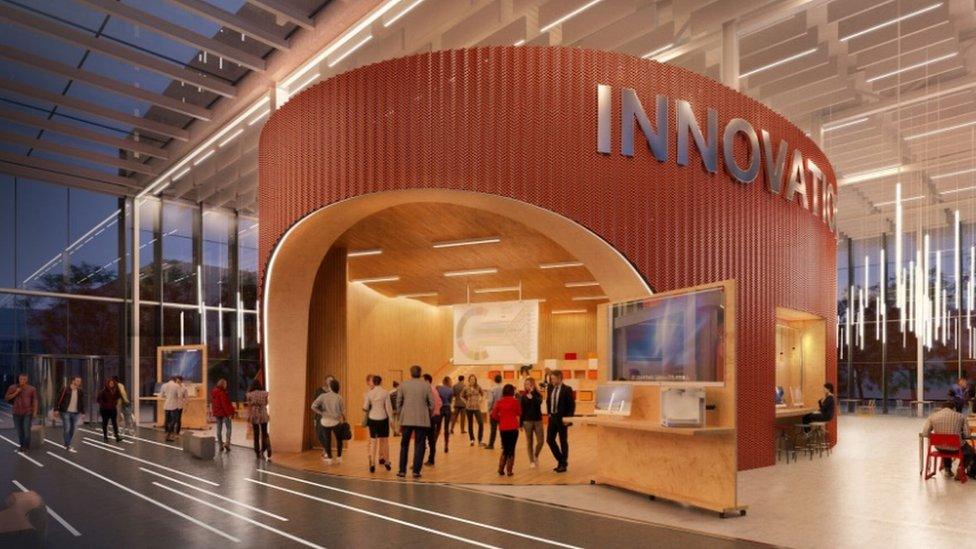
- Published4 October 2017
